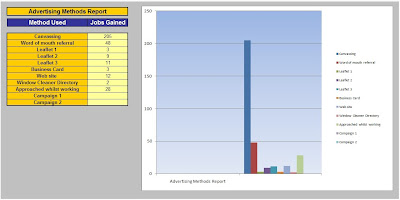
Sick Building Syndrome - What is it? Symptoms:
Building occupants complain of symptoms such as sensory irritation of the eyes, nose, throat; neurotoxic or general health problems; skin irritation; nonspecific hypersensitivity reactions; and odor and taste sensations. Several sick occupants may report individual symptoms which do not appear to be connected. The key to discovery is the increased incidence of illnesses in general with onset or exacerbation within a fairly close time frame - usually within a period of weeks. In most cases, SBS symptoms will be relieved soon after the occupants leave the particular room or zone. However, there can be lingering effects of various neurotoxins, which may not clear up when the occupant leaves the building. In particularly sensitive individuals, the potential for long-term health effects should not be overlooked.
Sick building causes are frequently pinned down to flaws in the heating, ventilation, and air conditioning (HVAC) systems. Other causes have been attributed to contaminants produced by outgassing of some types of building materials, volatile organic compounds (VOC), molds, improper exhaust ventilation of ozone (byproduct of some office machinery), light industrial chemicals used within, or fresh-air intake location / lack of adequate air filtration. Symptoms are often dealt with after-the-fact by boosting the overall turn-over rate of fresh air exchange with the outside air.

 Working night and day for a healthier office: Pollutants found inside office buildings can be converted into less harmful substances by a photochemical device that works continuously from night to day, claim scientists in Japan. This could prevent cases of sick building syndrome. Sick building syndrome is a combination of acute health and comfort issues that appear to be linked to time spent in a building, often in an office. This can be caused by inadequate ventilation or volatile organic compounds (VOCs), such as formaldehyde that are emitted by chemical contaminants from carpeting, upholstery, manufactured wood products, or photocopying machines and cleaning agents.
Working night and day for a healthier office: Pollutants found inside office buildings can be converted into less harmful substances by a photochemical device that works continuously from night to day, claim scientists in Japan. This could prevent cases of sick building syndrome. Sick building syndrome is a combination of acute health and comfort issues that appear to be linked to time spent in a building, often in an office. This can be caused by inadequate ventilation or volatile organic compounds (VOCs), such as formaldehyde that are emitted by chemical contaminants from carpeting, upholstery, manufactured wood products, or photocopying machines and cleaning agents.
Titanium dioxide (TiO2) photocatalysts have been applied to environmental remediation and self-cleaning coatings. However, most only work under UV light, which means they don't operate during the night. Now, Tetsu Tatsuma and colleagues at Tokyo University have overcome this problem by designing a photocatalyst with the ability to store photochemical energy. Tatsuma's photocatalyst has two layers; an TiO2 underlayer and an Ni(OH)2 overlayer. As the light is shone onto the device, its energy can be captured by the TiO2 underlayer and stored in the Ni(OH)2 overlayer. This stored energy is used to oxidise harmful VOCs, in particular formaldehyde, into less innocuous carbon dioxide and water, at any time.
In practice, Tatsuma expects the device to trap the harmful VOCs on the TiO2-Ni(OH)2 film during the night, then in the morning light, the pollutants are oxidised into less harmful by-products. Tatsuma has high hopes for his device and says 'we hope to apply it to private houses, offices and factories as coatings in curtains, window blinds and ceilings'. This device has the potential to improve indoor air quality and reduce the risk of illness by removing formaldehyde from the work environment. Mark Clayton, a Public Health Service Officer from the US EPA Indoor Environments Division, believes that this system 'could represent a significant advance in potentially reducing airborne concentrations of chemical compounds commonly found in an environment where most people spend 90 percent of their time. Employment of such a photocatalyst may have the potential to make a substantial contribution to ongoing efforts to improve air cleaning devices.'

 Oxidation of methanol and formaldehyde to CO2 by a photocatalyst with an energy storage ability: A TiO2–Ni(OH)2 bilayer photocatalyst is known as a photocatalyst with energy storage abilities. Oxidative energy from the UV-irradiated TiO2 underlayer can be stored in the Ni(OH)2 overlayer. We investigated oxidation and mineralization of methanol and formaldehyde by the stored oxidative energy by mean of gas chromatography. When the methanol concentration in air is as low as 10 ppm, the mass conversion efficiency from methanol to CO2 is 86%. Formaldehyde can also be oxidized to CO2 by the stored energy.
Oxidation of methanol and formaldehyde to CO2 by a photocatalyst with an energy storage ability: A TiO2–Ni(OH)2 bilayer photocatalyst is known as a photocatalyst with energy storage abilities. Oxidative energy from the UV-irradiated TiO2 underlayer can be stored in the Ni(OH)2 overlayer. We investigated oxidation and mineralization of methanol and formaldehyde by the stored oxidative energy by mean of gas chromatography. When the methanol concentration in air is as low as 10 ppm, the mass conversion efficiency from methanol to CO2 is 86%. Formaldehyde can also be oxidized to CO2 by the stored energy.
Building occupants complain of symptoms such as sensory irritation of the eyes, nose, throat; neurotoxic or general health problems; skin irritation; nonspecific hypersensitivity reactions; and odor and taste sensations. Several sick occupants may report individual symptoms which do not appear to be connected. The key to discovery is the increased incidence of illnesses in general with onset or exacerbation within a fairly close time frame - usually within a period of weeks. In most cases, SBS symptoms will be relieved soon after the occupants leave the particular room or zone. However, there can be lingering effects of various neurotoxins, which may not clear up when the occupant leaves the building. In particularly sensitive individuals, the potential for long-term health effects should not be overlooked.
Sick building causes are frequently pinned down to flaws in the heating, ventilation, and air conditioning (HVAC) systems. Other causes have been attributed to contaminants produced by outgassing of some types of building materials, volatile organic compounds (VOC), molds, improper exhaust ventilation of ozone (byproduct of some office machinery), light industrial chemicals used within, or fresh-air intake location / lack of adequate air filtration. Symptoms are often dealt with after-the-fact by boosting the overall turn-over rate of fresh air exchange with the outside air.

 Working night and day for a healthier office: Pollutants found inside office buildings can be converted into less harmful substances by a photochemical device that works continuously from night to day, claim scientists in Japan. This could prevent cases of sick building syndrome. Sick building syndrome is a combination of acute health and comfort issues that appear to be linked to time spent in a building, often in an office. This can be caused by inadequate ventilation or volatile organic compounds (VOCs), such as formaldehyde that are emitted by chemical contaminants from carpeting, upholstery, manufactured wood products, or photocopying machines and cleaning agents.
Working night and day for a healthier office: Pollutants found inside office buildings can be converted into less harmful substances by a photochemical device that works continuously from night to day, claim scientists in Japan. This could prevent cases of sick building syndrome. Sick building syndrome is a combination of acute health and comfort issues that appear to be linked to time spent in a building, often in an office. This can be caused by inadequate ventilation or volatile organic compounds (VOCs), such as formaldehyde that are emitted by chemical contaminants from carpeting, upholstery, manufactured wood products, or photocopying machines and cleaning agents.Titanium dioxide (TiO2) photocatalysts have been applied to environmental remediation and self-cleaning coatings. However, most only work under UV light, which means they don't operate during the night. Now, Tetsu Tatsuma and colleagues at Tokyo University have overcome this problem by designing a photocatalyst with the ability to store photochemical energy. Tatsuma's photocatalyst has two layers; an TiO2 underlayer and an Ni(OH)2 overlayer. As the light is shone onto the device, its energy can be captured by the TiO2 underlayer and stored in the Ni(OH)2 overlayer. This stored energy is used to oxidise harmful VOCs, in particular formaldehyde, into less innocuous carbon dioxide and water, at any time.
In practice, Tatsuma expects the device to trap the harmful VOCs on the TiO2-Ni(OH)2 film during the night, then in the morning light, the pollutants are oxidised into less harmful by-products. Tatsuma has high hopes for his device and says 'we hope to apply it to private houses, offices and factories as coatings in curtains, window blinds and ceilings'. This device has the potential to improve indoor air quality and reduce the risk of illness by removing formaldehyde from the work environment. Mark Clayton, a Public Health Service Officer from the US EPA Indoor Environments Division, believes that this system 'could represent a significant advance in potentially reducing airborne concentrations of chemical compounds commonly found in an environment where most people spend 90 percent of their time. Employment of such a photocatalyst may have the potential to make a substantial contribution to ongoing efforts to improve air cleaning devices.'

 Oxidation of methanol and formaldehyde to CO2 by a photocatalyst with an energy storage ability: A TiO2–Ni(OH)2 bilayer photocatalyst is known as a photocatalyst with energy storage abilities. Oxidative energy from the UV-irradiated TiO2 underlayer can be stored in the Ni(OH)2 overlayer. We investigated oxidation and mineralization of methanol and formaldehyde by the stored oxidative energy by mean of gas chromatography. When the methanol concentration in air is as low as 10 ppm, the mass conversion efficiency from methanol to CO2 is 86%. Formaldehyde can also be oxidized to CO2 by the stored energy.
Oxidation of methanol and formaldehyde to CO2 by a photocatalyst with an energy storage ability: A TiO2–Ni(OH)2 bilayer photocatalyst is known as a photocatalyst with energy storage abilities. Oxidative energy from the UV-irradiated TiO2 underlayer can be stored in the Ni(OH)2 overlayer. We investigated oxidation and mineralization of methanol and formaldehyde by the stored oxidative energy by mean of gas chromatography. When the methanol concentration in air is as low as 10 ppm, the mass conversion efficiency from methanol to CO2 is 86%. Formaldehyde can also be oxidized to CO2 by the stored energy.





















































